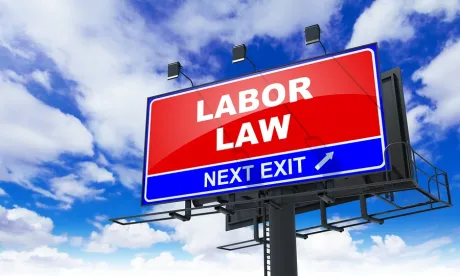-
Thus far in 2020, unions prevailed in mail ballot elections at the same rate as in-person elections. According to an October 16 Bloomberg report, although voter participation was low, unions won seven out of 10 National Labor Relations Board (NLRB) elections regardless of whether the election was conducted by mail ballot or in-person (manual) ballot. The results were consistent with those in elections conducted from 2015-2019. As for voter turnout in 2020, 69.1% participated in mail ballot elections, while more voters, 74.8%, cast ballots in manual elections. These participation numbers were down from the 2015-2019 average across mail and manual ballot elections, where 78.2% of all eligible voters cast ballots.
-
The NLRB approved an employer’s request for withdrawal from a stipulated election agreement due to unforeseeable operational changes resulting from COVID-19. Housing Works Inc., 29-RC-256430 (Oct. 15, 2020). The NLRB found a Regional Director erred in refusing to allow an employer to withdraw from a stipulated election agreement after the employer’s operations and workforce expanded rapidly and dramatically, as a result of COVID-19, and considerable time elapsed before the election was to be held. The employer operated a non-profit in the New York City area. On March 4, 2020, the employer and union entered into a stipulated election agreement providing for a mail-ballot election, and the ballots were scheduled to be mailed on March 20. On March 19, the NLRB announced it was suspending all elections (including mail-ballot elections) through April 3 due to the COVID-19 pandemic. In late-March, as a result of the pandemic, the employer added five new work locations to provide services for individuals with COVID-19. These new operations resulted in the hiring of approximately 230 new employees in classifications covered by the election agreement, but the new employees were excluded from the unit. The employer also scaled back many of the operations formerly staffed by eligible voters. After the NLRB resumed mail-ballot elections, the employer submitted a request to withdraw from the election agreement, alleging material terms underlying the agreement had changed due to the extraordinary circumstances caused by the pandemic. The Regional Director denied the request. On appeal, the NLRB reversed that decision, noting that a request to withdraw from a stipulated election agreement should be approved where a party makes an affirmative showing of unusual circumstances. The NLRB found the employer made such a showing. It found significant the dramatic change in business driven by circumstances not reasonably foreseeable at the time the parties entered into the election agreement and the length of time that had passed since the agreement had been struck. The NLRB said, “Given the nature and scope of the unforeseeable changes to its operations and their timing in relation to the date the parties entered into the Agreement, we find that the Employer has affirmatively shown the “convergence of complications which qualifies as an ‘unusual circumstance.’”
-
The NLRB included in its order of relief an employee’s 401(k) losses but not the employee’s contributions. Alameda Center for Rehabilitation and Healthcare, Inc., 370 NLRB No. 25 (Oct. 14, 2020). In this compliance proceeding, the NLRB assessed the proper remedy to impose on a successor employer that had agreed to abide by its predecessor’s collective bargaining agreement (CBA), but unlawfully delayed obtaining a replacement 401(k) plan for the predecessor’s. The NLRB adopted an Administrative Law Judge’s (ALJ) conclusion that remedial relief included making employees whole for the delinquent 401(k) matching contributions the employer unlawfully failed to make on their behalf, plus the investment growth the contributions would have experienced. However, the NLRB reversed the judge’s conclusion that the employer was required to contribute the amounts employees would have contributed to the 401(k) plan, reasoning that such relief is duplicative, because the employer paid employees those amounts in employees’ wages.
-
The NLRB invited briefs on bannering and displays of “Scabby the Rat.” International Union of Operating Engineers, Local Union No. 150 (Lippert Components, Inc.), 370 NLRB No. 40 (Oct. 27, 2020). The NLRB asked the parties and amici to submit briefs answering four questions related to a union’s display of a large inflatable rat, commonly called “Scabby the Rat,” and two large banners on public property near the entrance of a neutral employer’s site. Briefs by amici must be filed with the NLRB in Washington, D.C., on or before December 28, 2020. Under existing precedent, such displays, even when accompanied with a message to not patronize the neutral employer, are lawful under the NLRA. Previously, the NLRB found that such secondary conduct did not directly disrupt or threaten to disrupt the neutral employer’s operations. These precedents could be overruled based on the answers the NLRB receives to the following questions:
-
Should the NLRB adhere to, modify, or overrule existing precedent?
-
If the NLRB should modify or overrule existing precedent regarding what conduct constitutes proscribed picketing under National Labor Relations Act (NLRA) Section 8(b)(4), what should that standard be?
-
If the NLRB should modify or overrule existing precedent regarding its standard for determining what non-picketing conduct is otherwise unlawfully coercive under Section 8(b)(4), what should the standard be?
-
Why would finding that the conduct at issue in the case violated the NLRA under any proposed standard not result in a violation of the union’s rights under the First Amendment to the United States Constitution?
Christopher M. Repole contributed to this article.









 />i
/>i

